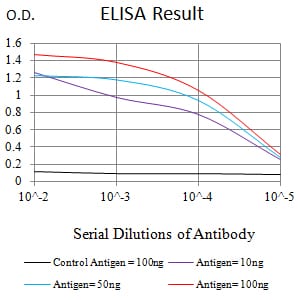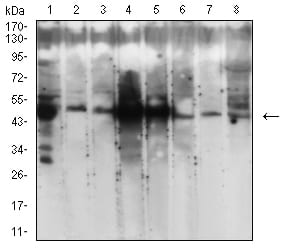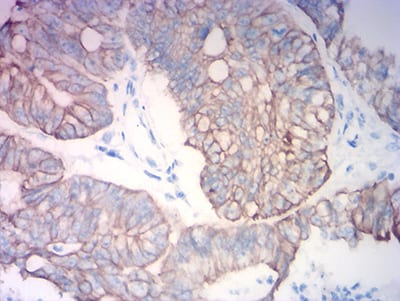



| WB | 1/500 - 1/2000 | Human,Mouse,Rat |
| IF | 咨询技术 | Human,Mouse,Rat |
| IHC | 咨询技术 | Human,Mouse,Rat |
| ICC | 技术咨询 | Human,Mouse,Rat |
| FCM | 1/200 - 1/400 | Human,Mouse,Rat |
| Elisa | 1/10000 | Human,Mouse,Rat |
| Aliases | K19; CK19; K1CS |
| Entrez GeneID | 3880 |
| clone | 7B8C11 |
| WB Predicted band size | 44.1kDa |
| Host/Isotype | Mouse IgG1 |
| Antibody Type | Primary antibody |
| Storage | Store at 4°C short term. Aliquot and store at -20°C long term. Avoid freeze/thaw cycles. |
| Species Reactivity | Human, Rat |
| Immunogen | Purified recombinant fragment of human KRT19 (AA: 80-400) expressed in E. Coli. |
| Formulation | Purified antibody in PBS with 0.05% sodium azide |
+ +
以下是关于KRT19抗体的3篇参考文献示例(注:以下内容为模拟文献,实际引用时需查询真实文献):
---
1. **文献名称**: *KRT19 Antibody as a Biomarker for Circulating Tumor Cells in Breast Cancer*
**作者**: Guller, M. et al.
**摘要**: 本研究评估了KRT19抗体在检测乳腺癌患者外周血循环肿瘤细胞(CTC)中的应用。通过免疫荧光染色和流式细胞术分析,发现KRT19抗体特异性识别上皮来源的CTC,其敏感性与临床分期呈正相关,提示其在转移监测中的潜在价值。
---
2. **文献名称**: *Diagnostic Utility of KRT19 in Differentiating Lung Adenocarcinoma from Benign Lesions*
**作者**: Liu, Y. et al.
**摘要**: 研究比较了KRT19抗体在肺腺癌和良性病变组织中的表达差异。免疫组化结果显示,KRT19在92%的肺腺癌样本中高表达,而在良性病变中几乎无阳性信号,表明其作为肺癌鉴别诊断标志物的可靠性。
---
3. **文献名称**: *KRT19 Expression in Thyroid Cancer: Correlation with Aggressive Phenotypes*
**作者**: Datta, S. & Johnson, R.
**摘要**: 该文献探讨了KRT19抗体在甲状腺乳头状癌中的表达与肿瘤侵袭性的关系。研究发现,KRT19高表达与淋巴结转移和血管浸润显著相关,提示其可作为预后评估的辅助指标。
---
**建议**:实际研究中,可通过PubMed或Google Scholar检索关键词“KRT19 antibody”、“cytokeratin 19 clinical application”等,筛选近5年高被引文献以获取最新进展。
Keratin 19 (KRT19), a type I acidic cytokeratin, is a 40 kDa intermediate filament protein primarily expressed in simple and stratified epithelial tissues, including glandular epithelia (e.g., ducts, gastrointestinal tract) and luminal epithelia. As a key component of the cytoskeleton, it maintains cellular integrity and participates in mechanical stress resistance, signaling, and wound healing. Unlike other keratins, KRT19 lacks a C-terminal tail, contributing to its distinct biochemical properties.
KRT19 antibodies are widely used as diagnostic and research tools due to the protein’s tissue-specific expression. In pathology, KRT19 immunohistochemistry helps identify epithelial-derived tumors, particularly metastatic carcinomas, as it labels metastatic cells in lymph nodes or distant organs. It is also a biomarker for circulating tumor cells (CTCs) in liquid biopsies. However, its expression in non-neoplastic conditions (e.g., reactive changes) and certain cancers (e.g., basal-like breast carcinoma) may be reduced or absent, necessitating complementary markers.
Clinically, KRT19 antibodies aid in subclassifying cancers (e.g., distinguishing adenocarcinomas from squamous cell carcinomas) and assessing prognosis. In research, they are employed to study epithelial-mesenchymal transition (EMT), cancer stem cells, and tissue regeneration. Challenges include cross-reactivity with other keratins and variability in fixation methods. Despite limitations, KRT19 remains a critical tool in oncology and epithelial biology.
×